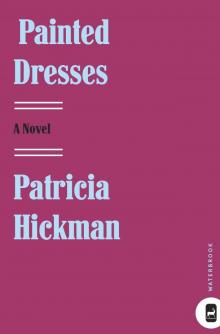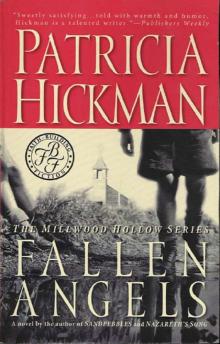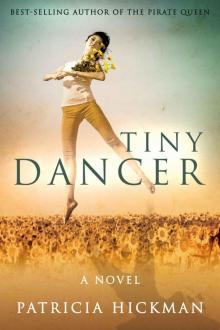- Home
- Patricia Hickman
Painted Dresses Page 11
Painted Dresses Read online
Page 11
I stepped out onto the gravel-littered parking lot. “I’ll give you some money,” I said, but she did not answer. “Spend it any way you want.”
The innkeeper must have heard us drive up. The back porch light came on.
My phone went off playing “Loser” by Jerry Garcia. I had set the ring tone on “Clair de Lune,” not being one to spend time changing out my phones ring tone or buying rock song tones. Delia had changed it behind my back. She was sending me a message. Delia stepped onto the porch, still wrapped in the green blanket, and disappeared inside the house.
“You’re not stupid,” I said, too late.
Braden was finally calling. He sounded mad. Instead of asking him about it, I sat breathing into the phone.
“Your boss called. Did she call you?” he asked.
“She didn’t,” I said. But come to think of it, Braden was the first to call all day. “But we’ve been in the mountains, and I haven’t had a signal.”
“That agent you hired is kind of young. Your boss doesn’t know how well she’s managing with you gone.”
“Kimberly’s fine. I’m taking personal time,” I said. “I never do, and I want to use it up before the year’s out.”
“Where are you, Gaylen? We need to get together and talk about things.”
“Delia’s in some trouble. Any cops come around?”
“Cops?”
“She has that drug dealer Mason Freeman mad at her.” I still couldn’t bring myself to tell him Delia shot Sophie.
“Let her work it out then. Take her back to Boiling Waters and drop her off. Come home. Delia wouldn’t risk anything for you, so why gamble your own neck for her?”
“She’s not right in her head, Braden. And now with Daddy gone, who would look after her?”
He didn’t answer.
“I was going to settle her into Daddy’s house. But now everything’s upside down. I don’t know what to do.” I wanted Braden to fix things, but the last time I hoped for that was the last time we argued. “Do you miss me at all?” I asked.
“Gaylen, while you were gone I talked to the attorney.”
“What about waiting on me, for us to talk it all out?” I asked. “We agreed.”
“We were playing cards one night, and the next thing I knew I was signing papers.”
Delia stuck her head out of the door, looking at me. I imagined the innkeeper was asking for a form of payment.
“If I tell you where I am, I want you to come here.” I blurted out. “We’ll talk. You know you don’t mean any of this.” I looked for an inn sign, but couldn’t see in the dark. “I’m at an inn up the coast in Edenton.”
“I’m supposed to fly a client to Concord at sunrise.” Braden sounded more detached than the night he left the apartment.
“Gaylen, this woman wants money!” Delia yelled from the back porch.
“I have to go,” I said. I was about to ask him again to come to Edenton. But I couldn’t think of how to say it. Braden hung up. I climbed out of the car, carrying my overnight bag up the hill and stuffing the phone into the pocket.
Delia was smiling. “We are living like queens,” she said.
I checked us each into a room, giving Delia her own place to sleep and me my own place to cry.
My mother was an upright woman. I lay in bed saying it, thinking about her, staring up at the Victorian ceiling made of painted-over tin squares. I imagined her triangular mouth when she was mad, talking about Delia and her endless list of transgressions. She liked talking about morals, about the haves and the have-nots of morality, like the woman who taught us girls Sunday school at the small Assemblies of God church she occasionally attended. Mother felt that women in the rank and file of church life looked down on her the same as the Sylers. Mother would say, “Her nose gets any higher, and she’ll need a ladder to blow it.” She liked organizing her ideals into a self-defense argument. Maybe she was preparing her case for Judgment Day, or maybe she was just tired of being put down by the Sylers.
But she included me in her self-justification; maybe I was her justification. But that’s a post too big for any kid.
I felt her swell of pride when she dubbed me as virtuous and Delia as wicked. But she was as wrong about me as she was about everything else in our lives she had summarized into a list of good and evil.
I stripped down in the bed-and-breakfast room, taking off everything that smelled of riding in the car all day with Delia smoking. My clothes smelled of the sundry contents of my car: the bag of apples in the backseat smelling overripe, Delia’s leftover supper from Bonnie’s café, and the cheese sandwiches still wrapped up like dead things in plastic wrap. I threw my blouse, my bra, my jeans that smelled potent after having my body compressed into them all day, and my pale yellow underwear onto the cold, flowery, linoleum floor. I stretched out across the bed, naked and crying. I turned off the phone so that I wouldn’t know how long it did not ring.
As little as I had confessed to Max, he could not have known me, seeing only the side of me that coveted his pity and affirmation. I recalled his tiny ocean cottage, the sunroom where we sipped coffee and listened to the ocean by night with the sliding door open. He gave me what I wanted so that I would give a lonely professor a warm body to curl up next to.
“Are you comfortable?” he asked.
“Sure,” I lied. I wore his robe over my swimsuit, a blue-striped terry-cloth covering that had aged over a decade without his noticing the frayed sleeves and hem. We had taken a swim near the shore. I was too afraid to go out far.
“Are you sorry you came?”
I kept looking toward the ocean, as if waiting for some good thing to come out of the black.
“I still can’t believe you’re here,” he said. By that, he might have meant that he was shocked that he played a seduction card with a student and it worked. But I did not question him or his motives. At least, not the way I questioned Braden. “Do you think about me when you’re at work? What am I like as a lover? If I were crippled, would you still stay with me?” Max got none of that side of me, just the simplistic pillow talk that does not require explanations.
Come to think of it, Braden might have liked me better if I’d given him the same safe distance.
“I’m not what you’re used to,” he said. “Your husband, he’s young, I know.”
“Maybe I don’t want what I’m used to,” I said but then realized what a cliché we were, sitting there trying to make the awkward seem exciting.
The heat was not working right, and the room was cold. I curled up on the bed, holding my knees against my chest. My own skin felt thin, like a veil that could not cover me up. I pulled the coverlet over me, deciding that if I died trying to freeze myself, being found naked and blue would only give Braden one more criticism to lay at my cold, lifeless feet.
I sipped a glass of white table wine that the innkeeper, calling herself Mrs. Buckhorn, offered Delia and me in the parlor after I’d checked us in. A realization came to me. I did not like white wine, even though I pretended to like it when Braden bought us a bottle for our last anniversary. I shoved the glass aside on the nightstand. Then I closed my eyes and slept, until three in the morning, got up and pulled on a sweatshirt and the Felix the Cat pajama bottoms.
A car door slammed outside. I slipped to the window and looked out. The moon was covered over, but a porch light left on turned everything in sight to sulfur. I blinked, believing my eyes weren’t seeing straight, at the man holding a cardboard box and walking across the back lot. He paused short of the rear porch. He searched around the lot until he looked directly at my car. Then he picked up the pace, aiming for the porch. In the brighter light, I could see him, my husband. Braden knocked on the back door. The window rattled.
I turned on the nightstand lamp and riffled through my suitcase until I found my mangy blue house slippers. I put them on, and fo
und myself looking into a vanity mirror, silver with longitudinal age streaks. My brown hair was falling aside my face, my cowlick exposed. I combed through my hair with my fingers and pulled it into a ponytail.
I walked out into the hallway. The innkeeper had left a table lamp turned on near the top of the stairs. The smell of smoke wafted from under Delia’s door even though Mrs. Buckhorn had told us that under no circumstances was smoking allowed in a historical inn.
I ran downstairs, stubbing my foot against a table leg, trying to make it to the rear door in less than a minute. Through the door sash, I saw Braden’s thinning hair aimed at the glass as if he was looking down. My face was flushed and full of blood. I could feel my veins pumping in my temples. The bottoms of my feet tingled as I slid across the floor, nearly tripping right dead in front of him. When I opened the door, he looked like a delivery boy holding a box. His hair was wet and combed to one side.
For a long and rather sickening minute, neither one of us knew what to say. I should have delayed, I thought, not rushed to meet him. In the nocturnal light, he was aged by a good five years. Braden was not the largest brother out of the two whopping men the Boatwrights had birthed. I had dated short men and tall men and always liked that he could hold me standing up without our eyes glaring straight into one another; we could have sex and fit like nesting cups. But his posture was stooped, and he looked down at me, holding a box as if he was going to hand it to me and leave.
I spoke first. “Did I tell you I was here?” I could not remember.
“An inn, you said, in Edenton. I drove round looking. I saw your car.” He wasn’t making eye contact. “You know your oil is due for a change. You missed your doctor’s appointment. Want me to cut that cast off for you?”
His nose was swollen, and when he finally stepped into the harshly lit hallway, his skin looked ruddy and bruised. He handed me the box, saying, “These are your brother’s belongings. Your Aunt Renni said it came to the house while you were gone. She found it on the porch; thought maybe you’d want it.”
The box had been opened. When I fingered the torn tape, he said, “I didn’t open it. Renni does what she wants.”
The address label was stamped with an address not far from Boiling Waters, but I had never visited that town. “Who would send me this?”
“Renni said a note was attached saying that your brother had left his things at someone’s house. When he was sent off, they didn’t want to be responsible for keeping his things. That’s what she thought.”
I walked into the living room, and Braden followed. We sat near the cold fireplace. “You get in a fight?” I asked.
He stared at the floor and finally looked up at me. “Your sister’s made enemies with the devil,” he said. “She upstairs?”
I nodded. “Asleep.”
“You never got all tangled up in her business before.” He said it like his disappointment in me had grown since our last fight.
“I know.” The cardboard box smelled like a house closed up too long. I placed it on the floor. “I wanted her to tell the police.”
“The law would be kinder than Mason Freeman.”
“Have you seen him?”
“No.”
“That’s a relief.”
“He sent a guy with a message. Delia nearly killed Sophie Deals. If she dies, he won’t stop until she’s dead. Even if she lives, Delia’s toast.”
“Is Sophie in the hospital?”
Braden regarded me as if he could not believe we were having that discussion.
“I hate it when you look at me like that,” I said.
“When a drug-dealing loser shows up to beat you up, you don’t sit down and have a conversation.”
I felt sick. “Was it tonight?”
“Right after I talked to you. I gave him a dose of his own, though.” The Boatwright boys were known as brawlers. “I pounded him, ran him off. But Freeman won’t stop there, sending a two-bit thug to do his dirty work.”
“I should’ve come home today.”
“He would have gone after you, and then I’d be in jail for killing him.”
I was going to say that I was sorry for hurting him. But he did not stay long. He had flown to a nearby private strip. He had a new client to fly into Kentucky the next morning. I was only a stopover.
Mrs. Buckhorn found me asleep on the couch. On the floor were Truman’s belongings and my unsigned divorce papers. She did not ask me why I was on the couch but said, “Breakfast is in the front room.” “Front” meaning a small room to the side of the kitchen used for days when the inn was not full of guests.
We ate French bread and a warmed currant jelly. She cooked our eggs to order. Delia hovered over her plate, picking at her food, her hair hanging over her eyes. “You ever sleep in?” she asked.
“At a B&B you eat when breakfast is served.” I had told Mrs. Buckhorn when we would get up, of course. Delia had to get some discipline about her.
“What’s in the box?” Delia asked me. The box was between us on the floor.
“Something belonging to Truman,” I said. I picked up the box, tucking the divorce papers under it. I pulled back the flaps. Inside was a pencil drawing of a man, shaven head, eyes like Mother’s.
“That’s a drawing of Truman,” said Delia.
“How do you know?” I asked.
“He looks like Mama,” she said. “I didn’t know he was an artist.”
“Maybe he didn’t draw it,” I said. But then she pointed to his signature. Besides the drawing, the box held a couple of pencils, a few receipts, and a locket. I picked up the gold necklace, a delicate chain that was soft against my palm. The locket was tarnished. It opened. A photo inside was of a teen girl with dark hair. Her eyes were dark too, like Truman’s. She might have been sixteen, but wasn’t recognizable.
“How’d you come by it?” she asked.
Mrs. Buckhorn was pouring my coffee. I waited until she went back into the kitchen.
“Braden showed up,” I told her. “He said Renni found it on Daddy’s porch. She drove it into Wilmington and gave it to Braden. I figure she was wanting an excuse to see him, to see if I was there or if we were really split up.”
“Nosy Ned.” She was still holding Truman’s self-portrait. “Are you split up for dead sure?”
I did not show her the papers Braden left for me to sign.
“What will you do with this stuff?” she asked.
“You can have all of it. I don’t want it,” I said.
“I’ll put it up. Maybe if he comes back, he’ll want it.”
“Why would he come back?” I asked.
“I wrote to him.”
“You shouldn’t have done that.”
Delia sighed. She opened her mouth to speak, but her jaw slid back, and she seemed to search for words. “That was back before I knew about him.”
“What do we know anyway? What Mother knew, she took to the grave.”
“Maybe Renni knows or Tootie. Maybe that’s why they fought with Mama,” said Delia. “Because of the secrets she kept.”
“Tootie tells everything she knows. Wouldn’t she have said something?”
“Would Renni tell?” she asked.
Renni was not one to divulge, I thought. “They don’t care about us, Delia.”
Delia put the drawing back into the box, laying it facedown inside the box. Then she picked it back up. “There’s a phone number on this,” she said. She reached for my cell phone.
“You don’t know who you’re calling,” I said.
She dialed anyway. Her mouth fell open, happy when a person answered. She asked the person if they knew Truman Savage. Then she sat nodding. When she ended the call, she was smiling the same as when she had power over me, when she found out about Max Swinson.
Mrs. Buckhorn came to clear away the breakfast d
ishes. I slid her my plate and cup and saucer with my one good hand. She stacked up Delia’s plates with mine and thanked us for stopping by. That was the last I saw of her.
“It was a woman,” Delia gushed. “The last time she saw Truman, she said, he was asking her for money, but she would not give him a cent.”
“Was she his girlfriend?” I asked.
“She didn’t say that but sounded like she was mad at him.”
“He had that effect, Mother once said.”
Delia picked up the phone again. She called information and asked for the number for Angola Prison.
“Why are you doing that?” I asked.
“My turn to be Nosy Ned,” she said.
“I’m going to get my suitcase,” I said. I went upstairs. Delia’s door was cracked open. I gave her room a look-see. Mrs. Buckhorn had already stripped her bed of the sheets. Delia’s purse was all that was in the room. I still had not bought her luggage or clothes other than the one set of clothes we had bought on the road. Renni told me that Mother saw to Delia and kept up her wardrobe and sent her to the beauty shop for haircuts. I was not any better at seeing after her than my father.
I picked up her purse and pack of cigarettes, collected my things, and met Delia at the foot of the stairs. She was giddy. When she followed me out to the car, she said, “You’re not going to believe this!”
I let her in the passenger side of the car and tossed my suitcase in the backseat. Once inside, she said, “I left a message for a man who counsels Truman. He’s going to tell me everything.”
“Of course he will,” I said.
“I’m smart.”
“You are, you are.”
10
I WAS STARTING to believe that Delia had been right about Mother, that she was a woman of secrets, secrets I hated because they had been kept from me and might have been about me. I pictured my father and mother lying in the ground, their hands over their mouths. I imagined taking a sledgehammer to their pretty little headstones.
Delia muttered under her breath, tapping the pack of cigarettes with her thumb. She pitied me for having been abandoned by my husband. “Delia, be quiet,” I said. Her pity wore me down, making the minutes seem longer and the miles pass slowly.

 Painted Dresses
Painted Dresses The Pirate Queen
The Pirate Queen Fallen Angels
Fallen Angels Earthly Vows
Earthly Vows Nazareth's Song
Nazareth's Song Whisper Town
Whisper Town Tiny Dancer
Tiny Dancer